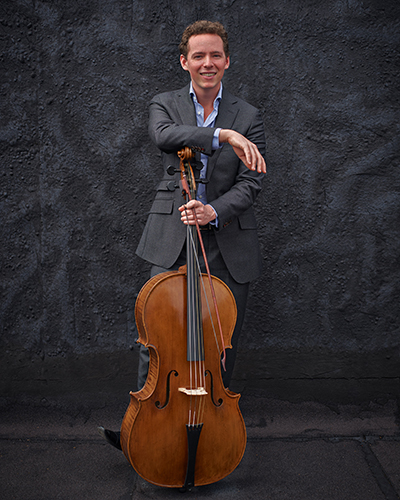We are thrilled to welcome Keiran Campbell in his first season as a member of Tafelmusik’s core orchestra. We sat down with Keiran to learn a bit more about him.
When did you start playing the cello?
I started when I was eight years old, although I think I tried (unsuccessfully) to play a full-size cello that was almost twice my size when I was much younger than that.
Describe your first music gig
I was about nine, and I played something at a church service. I’m not sure if you could call it a “gig,” since I definitely wasn’t paid (although I don’t think I understood the concept of being paid to play the cello at that point anyway). I don’t remember many details, but I do vividly remember that I was so nervous to play that my leg shook uncontrollably. I’m quite glad it doesn’t do that anymore …
Who has been your greatest inspiration?
Steven Isserlis. His career has been rather unconventional, and this really proved to me that musicians (and anyone else for that matter) don’t need to blindly follow the exact career path that the majority have taken, unless of course they find that doing so is inspirational! I think people who take the time to follow their personal interests make much more interesting music. Besides this, I am constantly inspired by his playing: Isserlis can make the cello sing in a way that almost no other cellist can.
What is your favourite music to listen to? It doesn’t have to be classical.
I’m never sure how to answer this, because like most people I don’t like to say that I have a favourite genre — it totally depends on my mood or what I am doing in that moment. So I paid attention to what I listened to over the course of the day recently and it went something like this: Frank Sinatra, Ella Fitzgerald, Lake Street Dive, a bunch of Salsa and Bachata, Notorious B.I.G., Jacob Collier, Jamiroquai, Mozart, Gluck, Sibelius, Matthew Locke, and Beethoven.
What are the last three songs/pieces you’ve listened to?
Sidney Bechet: Si tu vois ma mère
Arnold Schoenberg: Verklärte Nacht
What is your favourite thing to do in your free time?
I love to run, drink a lot of coffee, and do things with my hands (painting, drawing, fixing things around the house). I have always been especially obsessed with violin making, identification, and restoration. Growing up, I made paper models of whatever currently fascinated me (trains, boats, the Empire State Building…). Once I started playing the cello, I began making all sorts of paper instruments. Eventually I tried my hand at actual violin making, and I’ve been hooked ever since. I am studying (long-distance) with the maker of my own cello, Timothy Johnson, to make a violin based on an instrument made by Andrea Amati in 1566, the “Charles IX of France” Amati.
What is your favorite place in the world?
That’s definitely a tie between Prussia Cove in Cornwall, England, and anywhere in Tuscany, Italy.
What is your most treasured possession?
My cellos and bows!
What do you consider your greatest achievement?
I’ll let you know when I find out!
Which composer/artist/hero, living or not, would you like to sit next to at a dinner party, and why?
David Bowie, because I can’t even imagine what that conversation would be like.
What words of wisdom would you pass on to budding musicians?
My favourite advice was given to me by my musical hero: “Ignore the nonsense people spout about music.” At the time that this was said to me, I was extremely frustrated because I was at a crossroads between continuing traditional conservatory training and beginning formal studies in historical performance. Many musicians were telling me things like “studying the baroque cello will ruin your cello technique!” Of course, I had support from other people in my life that I really respected, but the negative comments were difficult to shake.
I partly love this advice because it was the last sentence in an email that was rather colourful and passionate (I remember it contained the exclamations “RUBBISH” and balderdash”). However, the real reason that the message stuck with me is that it encouraged me to explore a direction that really inspired me. It wasn’t meant to say “don’t listen to other people’s advice,” as I think that would be a huge mistake — rather, it firmly implied that everyone must find their own direction, and that one should never let a few negative comments or setbacks distract from the true goal.

